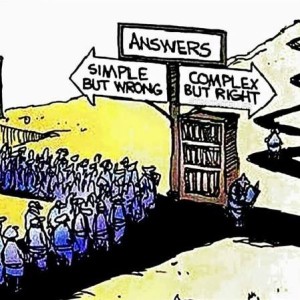首先我們要明白為何社會上部份人要追求智慧:
On a cosmic scale, our life is insignificant,
yet this brief period when we appear in the world
is the time in which all meaningful questions arise.
( Paul Ricoeur )
The beautiful thing about learning is
nobody can take it away from you.
( B. B. King )
If you stop learning, you stop growing.
問題是:學習,會有先入為主的現象!
所以隨之而來的問題是:
一個人如何判斷所接受的概念可靠?
一個人如何判斷所學到的東西並非半垃圾?
一個人如何判斷所學到的東西是否蕪菁混雜?
這就牽涉到哲學裡的「知識論」Epistemology!
The public have an insatiable curiosity to
know everything, except what is worth knowing.
( Oscar Wilde )
未接觸過哲學的人,會覺得哲學是個神聖又困難的領域,
正如喜歡聽音樂的人,會覺得音樂是個神聖又神秘的領域。
未接觸過哲學思考的人不會明白:
一個人的時間、精力、意志和毅力隨時都可能會被浪費。
所以哲學和教育必須面對同一問題:
那些知識對人生最為重要?
由於人類有不同的天賦,所以必須考慮個別因素。
懂得如何回答這個問題的人,已經具備相當的智慧。
True wisdom is to know
what is best worth knowing,
and to do what is best worth doing.
( Edward Porter Humphrey )
西方哲學思維的建議是:
We need to navigate our lives with
enough wisdom which differs from person
to person depending on their destinies.
Ask yourself what is really important,
what is crucial to your life,
and then have the wisdom and courage
to build your life around your answer.
叔本華也許是西方思想家中,
第一個提出「知難行易」這個概念的人。
他明白「知最難」,行比較易,
因為行只需要性格配合,只需要毅力,
甚至可以用群眾壓力和制度來威逼。
一旦「知」出了問題,就會選錯起跑線,
即使選對起跑線,亦可能方向錯誤。
一旦選錯了起跑線,努力或者有毅力的「行」,
就會完全浪費,成為一個天大的笑話
My desire is for wisdom,
not for the exercise of the will.
The will is the strong blind man
who carries on his shoulders
the lame man who can see.
( Arthur Schopenhauer )
聰明人都知道,
知識和技術是對自己的一種良好投資,
但學習知識和技術除了要付學費之外,
還要加上個人的努力和時間,肯定沒有 free lunch。
知識可以靠互聯網協助,技術需要親身磨鍊,
雖然它們都是一種可以空著雙手,隨身帶走的投資,
但不要忘記,兩者其實都可以請人代勞:
有了錢之後,可以聘請知識和技術人員代勞!
由於互聯網一日千里的蓬勃發展,
反而培育智慧出現了大量內容方面的 free lunch,
只不過依然需要個人的努力、時間和思考能力去親近。
佛家所說的「佛」就是「覺者」的意思,「覺」就是「悟」,
「覺、悟」當然需要足夠的智慧來思考人生重大的課題!
In the conditions of modern life the rule
is absolute, the race which does not value
trained intelligence is doomed.
( Alfred North Whitehead )
常見的現象是,
1. 一般人懂得衡量知識的價值,但不太懂得如何衡量智慧的價值。
他們不明白知識和技術需要不斷更新,因為知識和技術會落伍,
唯獨智慧跟你一世。
2. 很多人都希望自己有智慧,但大部份人只願意付出少少的代價。
原因是甚麼?
筆者認為可能和下面五個原因有關:
1. 培育智慧是一條比較學習知識和技術更為艱辛和崎嶇的道路。
2. 培育智慧並沒有受到「教育界」的重視。
即使理論上應該會重視宗教精神的教會學校,對它們來說,
「人活著不是單靠食物」亦只不過是一句口號。
3. 表面上智慧似乎不能夠帶來比較具體和實際的利益。
所以一般人只願意為「可以拿到文憑的知識和技術」付出代價。
4. 在培育智慧的過程中,必然需要面對如何克服四大阻力──
資本主義配合全球化所鼓勵的人性陰暗面:貪婪和自私,
雅俗共賞及不必要的虛偽,鄙視或歧視懷疑和批判的精神,
將面子和輩份置諸真理和公德之上的誘惑。
5. 知識和技術如果學習得不好,
不明白它們的根源和應用範疇,就會產生「所知障」。
培育智慧,就是要讓學習知識和技術的人明白這個道理。
所以「所知障」其實是「信念障」。
Knowledge, skills and wisdom have one thing
in common: they are all subsets of truth.
( Jason Ling )
關鍵是可以拿到文憑的知識和技術,
也許可以解決經濟問題,給我們帶來更美好的生活,
但智慧卻可以解決人生中種種抽象而重大的課題,
提供給我們更多選擇的空間,給我們帶來更美好的生命!
因為要鍛煉智慧,需要努力認識自己,管理自己,
對個人的性格、興趣、長處、短處都能掌握,
需要知己知彼,對人性的高點和低點有徹底的理解,
需要從整個人生及道德的角度來判斷
「個人在人生旅程中應如何作出抉擇」;
鍛煉智慧,除了需要培養宏觀的「森林思維」之外,
亦需要培育追根究底、鍥而不捨的「根源思維」。
知識和技術需要不斷更新,
理論和技術都需要「學而時習之」
[前者的習是指實踐,後者的習是指練習],
智慧則需要畢生去學習。
簡而言之,
就是「知識和技術改善生活,智慧改變生命。」
Never mistake knowledge for wisdom.
One helps you make a living;
the other helps you make a life.
( Sandra Carey )
There are many who know many things,
yet are lacking in wisdom.
( Democritus )
Science gives us knowledge,
but only philosophy can give us wisdom.
( Will Durant )
Knowledge shrinks as wisdom grows.
( Alfred North Whitehead )
自然界的知識是無限的,人類的生命是有限的。
人類從探索自然界而得到的知識,
是日積月累、不斷地膨脹的,每個人所知的必然有限。
判斷甚麼知識和生命價值有關,是必須的,最起碼的智慧,
而和生命價值無關的知識,則往往出現在茶餘飯後的話題。
沒有足夠的智慧,生命將如何度過?
勵志者喜歡告訴我們:
當一扇門關上了之後,就會有另一扇門為我們打開,
但如果沒有足夠的智慧,我們會察覺到打開了的那一扇門嗎?
True wisdom comes to each of us when we
realize how little we understand about life,
ourselves, and the world around us.
( Socrates )
Life is made up of a series of judgments on
insufficient data, and if we waited to run down
all our doubts, it would flow past us.
( Judge Learned Hand )
Life is the art of drawing sufficient conclusions
from insufficient premises.
( Samuel Butler )
心理學家榮格 Carl Gustav Jung 說:
「有些人身體健康,心智正常,但是卻不快樂。」
回歸心靈的人才會重視哲學,而哲學思考的鍛煉,
無非是希望每一個人都能夠有價值地活著!
Alain de Botton
Reintroducing Wisdom in Everyday Life
智慧唯一令人感慨的地方,
就是當我們向別人佈施智慧的時候,努力往往都會白費,
因為社會上大約有百分之四十的人只喜歡半桶水的思考,
喜歡將自己的面子、輩份和虛榮置諸追求智慧之上,
但只有百分之十的人才會喜歡鍥而不捨地追求智慧!
在未來二十年人工智能電腦和機械人蓬勃發展的時代,
智慧就會顯得越來越重要,以前曾經覺得足夠的智慧,
到了那個時代,就會變得落伍和不足。
追求智慧的人都有下列的共通點:
☆ They choose their teachers and friends carefully.
☆ They don’t hold grudges against good and wise people.
They always speak well of them,
and stay connected with them.
☆ They give more and do not expect any return.
☆ They are neither optimistic nor pessimistic.
They are realistic [如是觀].
☆ They take good care of their bodies,
exercise regularly, eat healthily,
spend time in nature, and laugh often.
☆ They enjoy critical thinking and reject foolishness.
☆ They share their wisdom openly.
☆ They accept what cannot be changed.
☆ They are perfectionists. They always try their best.
